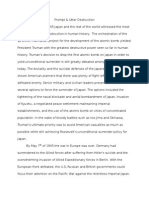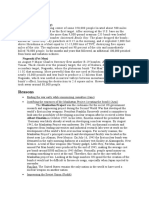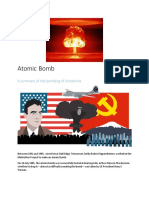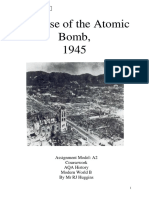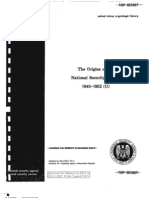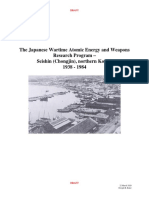08 - Was It Necessary To Drop The Bomb
08 - Was It Necessary To Drop The Bomb
Uploaded by
api-283373436Copyright:
Available Formats
08 - Was It Necessary To Drop The Bomb
08 - Was It Necessary To Drop The Bomb
Uploaded by
api-283373436Original Title
Copyright
Available Formats
Share this document
Did you find this document useful?
Is this content inappropriate?
Copyright:
Available Formats
08 - Was It Necessary To Drop The Bomb
08 - Was It Necessary To Drop The Bomb
Uploaded by
api-283373436Copyright:
Available Formats
Was it necessary to drop the atom bomb on Japan?
Sixty years later, scholars still argue about the decision to use atom bombs against Hiroshima and Nagasaki as a way to
hasten the end of World War II
YES
The atomic bomb was necessary to end the war with Japan
at the earliest possible moment. By the early summer of
1945, Japanese leaders knew they could not win. But they
fought on in hopes of securing better surrender terms.
President Harry S. Truman considered several ways to
convince Japan to quit the war: 1) intensifying the already
heavy bombing of Japanese cities; 2) waiting for the Soviet
Union, an ally in defeating Germany, to join the war against
Japan; 3) allowing Japan's emperor, Hirohito, to remain on
his throne; and 4) invading Japan.
The first three options were far from certain to compel a
Japanese surrender quickly, however, and each posed
serious military, political, and diplomatic risks. More than
55,000 Americans had already died fighting the Japanese in
the Pacific. An invasion was certain to be very costly in
American lives.
When the atomic bomb became available in July 1945, it
appeared to be the most promising way to end the war as
soon as possible and without the drawbacks of the
alternatives.
The atomic bombing of Hiroshima and then Nagasaki
persuaded Emperor Hirohito, who had wavered for weeks,
that the war must end immediately. Combined with the
Soviet entry into the conflict, the atom bombs brought about
Japan's surrender within a few days.
The bomb was necessary to accomplish Truman's primary objectives of forcing a prompt Japanese surrender and saving American
lives, perhaps thousands of them.
J. Samuel Walker, Author
Prompt & Utter Destruction: Truman and the Use of Atomic Bombs Against Japan
NO
When General Dwight D. Eisenhower, then the Supreme Allied Commander, was informed by the Secretary of War that the atomic
bomb was going to be used, he later recalled saying it was unnecessary because Japan was already largely defeated. Eisenhower
said the bomb was "no longer mandatory as a measure to save American lives." At one point after the war he said bluntly, "It
wasn't necessary to hit them with that awful thing."
Before the bomb was used, U.S. intelligence officials believed the war would likely end when two things happened: When the U.S.
let Japan know their Emperor could stay on as a figurehead, and when the Soviet army attacked. The U.S. did tell Japan the
Emperor could remain, and the Soviets declared war, as agreed, on August 8.
But U.S. officials chose not to test whether this intelligence was correct. Instead, Hiroshima was bombed on August 6, and
Nagasaki on August 9. Because of logistics, an invasion of Japan could not begin for another three months, so the U.S. could have
waited to see if Japan would surrender before dropping the atomic bombs.
Most top World War II military leaders are all on record agreeing with Eisenhower. Admiral William Leahy, President Truman's
Chief of Staff, later called the bomb a "barbarous weapon" that was unnecessary. Leahy wrote, "The Japanese were already
defeated and ready to surrender. . . . In being the first to use it, we . . . adopted an ethical standard common to the barbarians of
the Dark Ages."
Gar Alperovitz
Professor of Political Economy
University of Maryland
You might also like
- Research Essay FinalDocument7 pagesResearch Essay FinalYun YangNo ratings yet
- Jose P. Laurel and Jorge B. Vargas - Issues of Collaboration and LDocument54 pagesJose P. Laurel and Jorge B. Vargas - Issues of Collaboration and LRoland Raymond Roldan100% (1)
- History of U.S. Table Tennis - Vol. II: 1940-1952Document396 pagesHistory of U.S. Table Tennis - Vol. II: 1940-1952Tim Boggan100% (1)
- Extended EssayDocument19 pagesExtended EssayYusuf AdamuNo ratings yet
- Cinema, Censorship, and The State: The Writings of Nagisa Oshima, 1956-1978Document4 pagesCinema, Censorship, and The State: The Writings of Nagisa Oshima, 1956-1978livija mikic0% (1)
- AP US History 1 Internal Assessment (06-07)Document11 pagesAP US History 1 Internal Assessment (06-07)Dan Wang87% (15)
- A2 History CourseworkDocument13 pagesA2 History CourseworkHolly DaherNo ratings yet
- Prompt and Utter DestructionDocument9 pagesPrompt and Utter DestructionBanks FerrellNo ratings yet
- Atomic Diplomacy Hiroshima Si NagasakiDocument8 pagesAtomic Diplomacy Hiroshima Si NagasakiMarian HarapceaNo ratings yet
- Pearl Harbor Argumentative EssayDocument7 pagesPearl Harbor Argumentative Essayapi-509585875100% (1)
- 49 - Atomic Bomb DBQDocument11 pages49 - Atomic Bomb DBQDaniel AlabreNo ratings yet
- Atomic Bomb Readings and Graphic Org 19Document2 pagesAtomic Bomb Readings and Graphic Org 19Geoffjj TangNo ratings yet
- Peral Harbor To HiroshimaDocument7 pagesPeral Harbor To HiroshimaAlex CostinNo ratings yet
- The Bomb Didn't Beat Japan Stalin Did - Foreign PolicyDocument16 pagesThe Bomb Didn't Beat Japan Stalin Did - Foreign PolicySangre Para Los NiñosNo ratings yet
- HiroshimaDocument3 pagesHiroshimaMaaria SulaymanNo ratings yet
- Actual HipDocument4 pagesActual HipnikkiglitzyNo ratings yet
- Why Did Japan SurrenderDocument4 pagesWhy Did Japan Surrendervidro3No ratings yet
- AP Lang Argumentative EssayDocument4 pagesAP Lang Argumentative EssayAnonymous VV7vBSakeNo ratings yet
- Pros and Cons - Atomic BombsDocument4 pagesPros and Cons - Atomic Bombs123samafazilNo ratings yet
- Hiroshima. (Little Boy)Document4 pagesHiroshima. (Little Boy)Arpi OrujyanNo ratings yet
- The Bomb Didn't Beat Japan Stalin Did - Foreign PolicyDocument14 pagesThe Bomb Didn't Beat Japan Stalin Did - Foreign Policyabhiscribd2010100% (1)
- Handout 04Document7 pagesHandout 04Vishesh JainNo ratings yet
- Whether Americans Were Justified or Not in Dropping The Atomic Bomb On JapanDocument4 pagesWhether Americans Were Justified or Not in Dropping The Atomic Bomb On JapanNawal AamirNo ratings yet
- The Fat Bomb That Should Not Have Went KaboomDocument4 pagesThe Fat Bomb That Should Not Have Went KaboomMatthew MulderNo ratings yet
- Empire of Japan World War II United States Allies Japan Nuclear Weapons Hiroshima Nagasaki U.S. President Harry S. Truman Manhattan ProjectDocument1 pageEmpire of Japan World War II United States Allies Japan Nuclear Weapons Hiroshima Nagasaki U.S. President Harry S. Truman Manhattan ProjectAlex StoianNo ratings yet
- The Decision To Drop The Bomb - Non-Fiction Text 3Document2 pagesThe Decision To Drop The Bomb - Non-Fiction Text 3api-742562296No ratings yet
- Atomic Bomb DBQDocument2 pagesAtomic Bomb DBQIsabella Price-DubbleNo ratings yet
- Crucial Decisions - The Causes of The Atomic Bombings - (Stefano Spinello)Document4 pagesCrucial Decisions - The Causes of The Atomic Bombings - (Stefano Spinello)stef.spinelloNo ratings yet
- Atomic Bomb - Arguments For-Against 16-17Document2 pagesAtomic Bomb - Arguments For-Against 16-17almohammedrodha5No ratings yet
- 1988 DBQ - Dropping The Atomic Bomb PDFDocument5 pages1988 DBQ - Dropping The Atomic Bomb PDFdeabtegoddNo ratings yet
- Traducción Parte Libro de J. WrightDocument6 pagesTraducción Parte Libro de J. WrightAna Puelles OblitasNo ratings yet
- Unit 6 - Dropping The BombDocument3 pagesUnit 6 - Dropping The Bombapi-300752277No ratings yet
- Hiroshima EssayDocument2 pagesHiroshima Essayapi-241206570No ratings yet
- Truman and The Atomic BombDocument5 pagesTruman and The Atomic BombPaulNo ratings yet
- 16 Advantages and Disadvantages of Dropping The Atomic BombDocument6 pages16 Advantages and Disadvantages of Dropping The Atomic BombBabo Beretta100% (1)
- YesornoatomicbombonjapanDocument3 pagesYesornoatomicbombonjapanapi-328698265No ratings yet
- Atomic Bomb: A Summary of The Bombing of HiroshimaDocument8 pagesAtomic Bomb: A Summary of The Bombing of HiroshimasenseiNo ratings yet
- Atomic Bomb DebateDocument8 pagesAtomic Bomb DebateChris ShanahanNo ratings yet
- Historical Research ISUDocument3 pagesHistorical Research ISUjjNo ratings yet
- america decision to drop the atomic bomb on japan 일본항복 원폭 트루먼 히로시마 소련참전 스탈린Document74 pagesamerica decision to drop the atomic bomb on japan 일본항복 원폭 트루먼 히로시마 소련참전 스탈린강원조No ratings yet
- Pure NihilismDocument6 pagesPure NihilismMiriamNo ratings yet
- Student Composed Words (No More Than 1,200)Document3 pagesStudent Composed Words (No More Than 1,200)Brayan TiburcioNo ratings yet
- Atomic Bombing of JapanDocument5 pagesAtomic Bombing of JapanXule LiNo ratings yet
- Investigative PaperDocument2 pagesInvestigative PaperSion JoNo ratings yet
- Milestones 1945-52Document40 pagesMilestones 1945-52GáborNagyNo ratings yet
- History Assessment 2 Term 3Document2 pagesHistory Assessment 2 Term 3turirirNo ratings yet
- Decision To Drop The Atomic BombDocument3 pagesDecision To Drop The Atomic BombMinh Nguyen Duc100% (1)
- The Dropping of The Atomic Bomb On HiroshimaDocument12 pagesThe Dropping of The Atomic Bomb On HiroshimaSabyna BurcaNo ratings yet
- War Bet. Us and JapanDocument5 pagesWar Bet. Us and Japanernesto pitogoNo ratings yet
- SS 5 Term 2 PDFDocument22 pagesSS 5 Term 2 PDFDauxTale Frisk DreemurrNo ratings yet
- Morality of Atom BombsDocument18 pagesMorality of Atom BombsDavid SalgadoNo ratings yet
- Why Hiroshima As The Target of US Atomic Bomb in 1945Document6 pagesWhy Hiroshima As The Target of US Atomic Bomb in 1945Anonymous izrFWiQNo ratings yet
- The Use of The Atomic Bomb, 1945: Assignment Model: A2 Coursework AQA History Modern World B by MR RJ HugginsDocument5 pagesThe Use of The Atomic Bomb, 1945: Assignment Model: A2 Coursework AQA History Modern World B by MR RJ HugginsZaina ImamNo ratings yet
- Paper 22Document17 pagesPaper 22api-338664051No ratings yet
- If The Atomic Bomb Had Not Been UsedDocument5 pagesIf The Atomic Bomb Had Not Been Usedapi-296327771No ratings yet
- TheatomicbombDocument6 pagesTheatomicbombapi-283841611No ratings yet
- The Atomic Bomb and The End of World War IIDocument48 pagesThe Atomic Bomb and The End of World War IIMarian HarapceaNo ratings yet
- Atomic Bomb StudentDocument7 pagesAtomic Bomb Studentapi-458162553No ratings yet
- Summary, Analysis & Review of Bill O’Reilly’s and Martin Dugard’s Killing the Rising SunFrom EverandSummary, Analysis & Review of Bill O’Reilly’s and Martin Dugard’s Killing the Rising SunNo ratings yet
- On The Morning of August 6Document1 pageOn The Morning of August 6Anthony LairdNo ratings yet
- Bahasa Inggris Alvin Siswanto RPL XDocument3 pagesBahasa Inggris Alvin Siswanto RPL Xalvin siswantoNo ratings yet
- Japanese Era.02Document4 pagesJapanese Era.02Lijea MunicitNo ratings yet
- Origins of Nsa PDFDocument155 pagesOrigins of Nsa PDFdagger21No ratings yet
- Chongjin 22 Mar 2020Document66 pagesChongjin 22 Mar 2020Dwight R RiderNo ratings yet
- The Historians History of The World Poland The Balkans Turkey Minor v1 1000194081Document711 pagesThe Historians History of The World Poland The Balkans Turkey Minor v1 1000194081Milan Ranđelović100% (1)
- Westernization of East Asia: Asian Civilizations II Jervy C. Briones Lecturer, Saint Anthony Mary Claret CollegeDocument29 pagesWesternization of East Asia: Asian Civilizations II Jervy C. Briones Lecturer, Saint Anthony Mary Claret CollegeNidas ConvanterNo ratings yet
- Peak Japan. The End of Great Ambitions (Brad Glosserman) (Z-Library)Document272 pagesPeak Japan. The End of Great Ambitions (Brad Glosserman) (Z-Library)jetxoNo ratings yet
- Asian Political ThoughtDocument8 pagesAsian Political ThoughtNikita Bayot75% (4)
- Edgy ManifestoDocument8 pagesEdgy ManifestoSlickaBility33% (3)
- People Vs AdrianoDocument5 pagesPeople Vs AdrianoMagr Esca100% (1)
- Fall of SingaporeDocument35 pagesFall of SingaporeGlenn WongNo ratings yet
- Pentagon Papers Part V B1Document89 pagesPentagon Papers Part V B1Aaron MonkNo ratings yet
- World War Performance Task: By: Sandra MouaDocument39 pagesWorld War Performance Task: By: Sandra MouaSandra MouaNo ratings yet
- Us History Weebly ExamDocument6 pagesUs History Weebly Examapi-254155357No ratings yet
- Li Narangoa - Robert Cribb - Imperial Japan and National Identities in Asia, 1895-1945-Routledge (2003)Document384 pagesLi Narangoa - Robert Cribb - Imperial Japan and National Identities in Asia, 1895-1945-Routledge (2003)Hanief AdrianNo ratings yet
- Thesis For Pearl Harbor EssayDocument8 pagesThesis For Pearl Harbor Essayaflnzraiaaetew100% (2)
- Lin 2001Document26 pagesLin 2001kanye zhangNo ratings yet
- Javier Japanese Cultural Propaganda PhilippinesDocument16 pagesJavier Japanese Cultural Propaganda PhilippinesJo RinzNo ratings yet
- Encyclopedia of Social History PDFDocument1,195 pagesEncyclopedia of Social History PDFAndrijaNo ratings yet
- History and Civics MatriculationDocument233 pagesHistory and Civics MatriculationAravind LabNo ratings yet
- An Expanding WorldDocument16 pagesAn Expanding Worldapi-293989887No ratings yet
- USSBS Reports No.56, Effects of Air Attack On Urban Complex: Tokyo-Kawasaki-YokohamaDocument83 pagesUSSBS Reports No.56, Effects of Air Attack On Urban Complex: Tokyo-Kawasaki-YokohamaJapanAirRaids100% (1)
- The Japanese Movement To Correct HistoryDocument9 pagesThe Japanese Movement To Correct Historyrodriguesfortes6711No ratings yet
- Japan Since 1980Document330 pagesJapan Since 1980JianBre100% (4)
- Address To The People of The Philippines by Lieutenant General Masaharu Homma CommanderDocument5 pagesAddress To The People of The Philippines by Lieutenant General Masaharu Homma CommanderAria neNo ratings yet
- Preliminary InvestigationDocument4 pagesPreliminary InvestigationAimee HernandezNo ratings yet
- JAPAN Insurance MarketDocument12 pagesJAPAN Insurance MarketGabriela DendeaNo ratings yet







